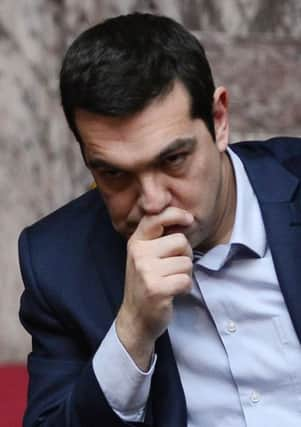Germans pour cold water on Greeks’ bailout deal


The Greek government offered to extend its rescue loan agreement by six months, as the 19-country eurozone had demanded in order to give all sides more time to reach a more permanent deal.
It held back, however, on offering to continue in full a series of budget cuts and reforms the eurozone has required since 2010 in exchange for loans, but that Greece blames for devastating its economy.
Advertisement
Hide AdAdvertisement
Hide AdGerman finance ministry spokesman Martin Jaeger dismissed it as “not a substantial proposal for a solution”.
He said it amounted to a request “for bridge financing without fulfilling the demands of the [bailout] programme”, namely the budget measures. It did not, he added, correspond to what the eurozone countries had demanded of Greece before talks broke down on Monday.
FOLLOW US
SCOTSMAN TABLET AND MOBILE APPS
The European Commission was somewhat more upbeat. Spokesman Margaritis Schinas said its president, Jean-Claude Juncker, “sees in this [Greek] letter a positive sign which, in his assessment, could pave the way for a reasonable compromise in the interest of financial stability in the euro area as a whole”.
He said Mr Juncker had held talks on Wednesday, overnight and early yesterday with Greek PM Alexis Tspiras and Dutch finance minister Jeroen Dijsselbloem, who heads meetings of eurozone finance ministers.
The Greek proposal included no mention of continuing the series of budget cuts and reforms the eurozone has required since 2010 in exchange for the rescue loans. Germany insists on those measures, which are likely to be a key point in the talks today.
In a possible concession to the eurozone, Greece’s proposal doesn’t specifically mention the government’s pre-election pledge of seeking forgiveness for most of its debts.
Greek shares dipped on news of Germany’s cool reaction but later recovered their losses and were trading 1 per cent up.
Analyst Evangelos Sioutis, head of equities at Guardian Trust Securities, said a rift with Greece’s creditors would be in nobody’s interest, but warned a deal was needed fast. “If there’s no agreement in the next few days there is a risk of [a bank run] because liquidity in Greek banks is very limited and there are many who say that capital controls are very close,” he said.
Advertisement
Hide AdAdvertisement
Hide AdThe European part of Greece’s bailout expires on 28 February. If no deal is reached by then, the European Central Bank would face pressure from eurozone governments to cut off emergency financing for Greek banks.